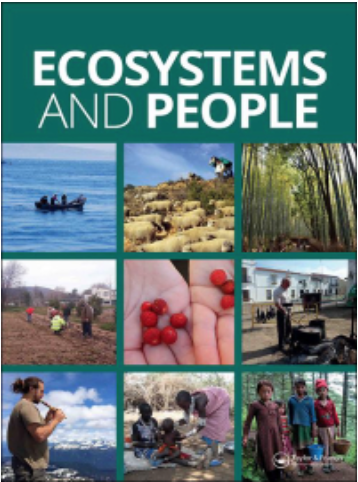
Advancing a toolkit of diverse futures approaches for global environmental assessments
Author(s): Laura Pereira, Jan J. Kuiper, Odirilwe Selomane, Ana Paula D. Aguiar, Ghassem R. Asrar, Elena M. Bennett, Reinette Biggs, Katherine Calvin, Steve Hedden, Angel Hsu, Jason Jabbour, Nicholas King, Alexandre C. Köberle, Paul Lucas, Jeanne Nel, Albert V. NorsLink to CST author(s): Dr. Laura Pereira, Prof. Reinette (Oonsie) Biggs, Dr. Odirilwe Selomane
Publication: Ecosystems and People
Year: 2021
Full reference: Laura Pereira, Jan J. Kuiper, Odirilwe Selomane, Ana Paula D. Aguiar, Ghassem R. Asrar, Elena M. Bennett, Reinette Biggs, Katherine Calvin, Steve Hedden, Angel Hsu, Jason Jabbour, Nicholas King, Alexandre C. Köberle, Paul Lucas, Jeanne Nel, Albert V. Norström, Garry Peterson, Nadia Sitas, Christopher Trisos, Detlef P. van Vuuren, Joost Vervoort & James Ward (2021) Advancing a toolkit of diverse futures approaches for global environmental assessments, Ecosystems and People, 17:1, 191-204, DOI: 10.1080/26395916.2021.1901783
Summary
Global Environmental Assessments (GEAs) are in a unique position to influence environmental decision-making in the context of sustainability challenges. To do this effectively, however, new methods are needed to respond to the needs of decision-makers for a more integrated, contextualized and goal-seeking evaluation of different policies, geared for action from global to local. While scenarios are an important tool for GEAs to link short-term decisions and medium and long-term consequences, these current information needs cannot be met only through deductive approaches focused on the global level. In this paper, we argue that a more diverse set of futures tools operating at multiple scales are needed to improve GEA scenario development and analysis to meet the information needs of policymakers and other stakeholders better. Based on the literature, we highlight four challenges that GEAs need to be able to address in order to contribute to global environmental decision-making about the future: 1. anticipate unpredictable future conditions; 2. be relevant at multiple scales, 3. include diverse actors, perspectives and contexts; and 4. leverage the imagination to inspire action. We present a toolbox of future-oriented approaches and methods that can be used to effectively address the four challenges currently faced by GEAs.

